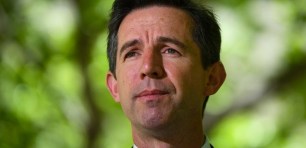
UK Prime Minister Boris Johnson and Australian Primer Minister Scott Morrison. Source: AP/Leon Neal Pool.
Prime Minister Scott Morrison has called the Australia-UK free trade agreement that will cut tariffs on 99% of Aussie goods ‘the right deal’ for the nation.
Announcing the agreement, which was signed on Tuesday evening, Morrison said tariffs will be gradually removed over a decade and greatly benefit the agriculture industry.
“I said we would wait for the right deal and I think we’ve got the right deal between UK and Australia,” he said.
Here are the key industries the free trade agreement includes.
Meat trade
Under the deal, tariffs on beef and lamb will be gradually phased out over 10 years. In the transition period, exporters will receive large quotas for tariff-free shipments into Britain. For example, beef farmers will have immediate access to a duty-free quota of 35,000 tonnes, gradually rising to 110,000 tonnes over a decade.
Sugar producers
Tariffs on sugar will be abolished in eight years. Like producers in the meat industry, Australian sugar producers will be able to export goods tariff-free as soon as the agreement comes into effect, with quotas starting at 80,000 tonnes and gradually increasing.
Dairy industry
Australian dairy exporters will be able to ship goods to the UK tariff-free in five years, with immediate access to a duty-free quota for cheese of 24,000 tonnes, rising in instalments to 48,000 tonnes over five years. Non-cheese dairy products will also have access to tariff-free exports of 20,000 tonnes each year.
Wine producers
Tariffs on Australian wines entering the UK will also be abolished, with a duty-free arrangement starting as soon as the agreement enters into force.
Foreign workers
Many Australian industries will have access to a larger international talent pool, with the trade deal expanding the working holiday visa program to include adults aged up to 35. Previously, British citizens could secure a visa up to the age of 30.
The change, however, will not benefit the farming industry, as any requirement for UK visa holders to work on farms will likely be removed.
Professionals are expected to benefit from greater recognition of qualifications between the two countries, making it easier for some skilled professionals to enter the Australian labour market and vice versa.
Regulatory issues
The UK’s meat industry is concerned lower regulatory standards in Australia’s meat industry will undercut prices for British producers. For example, Australia has industrial scale ranches which hold up to 50,000 animals, and allows practices banned in the UK such as “mulesing” and the use of some antibiotics.
The farming industry has similar concerns. In the UK, there are more than 30 active substances banned from use that are not illegal in Australia, including the weedkiller paraquat.
Handpicked for you

Retailers, manufacturers, and researchers agree: Non-alcoholic beverages are booming



COMMENTS
SmartCompany is committed to hosting lively discussions. Help us keep the conversation useful, interesting and welcoming. We aim to publish comments quickly in the interest of promoting robust conversation, but we’re a small team and we deploy filters to protect against legal risk. Occasionally your comment may be held up while it is being reviewed, but we’re working as fast as we can to keep the conversation rolling.
The SmartCompany comment section is members-only content. Please subscribe to leave a comment.
The SmartCompany comment section is members-only content. Please login to leave a comment.